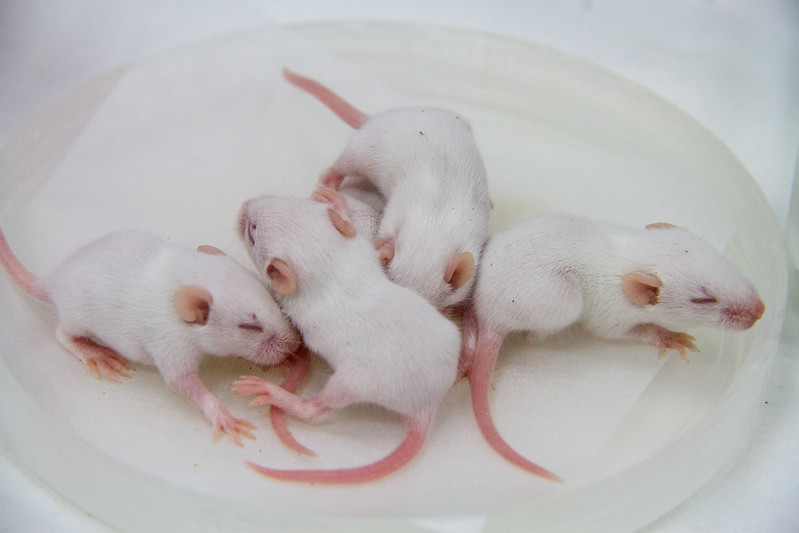
The marriage of biology with technology is flourishing as companies pursue new ways to bring computational techniques to drug research. The goal is to make the iterative processes of drug discovery scalable, which in turn makes the entire endeavor faster and more efficient. But no matter how much of this work is done with software and mouse clicks, at some point a novel molecule must eventually find its way into a real, live mouse. And that’s where startup Manifold Bio aims to stand apart.
The early work of traditional drug discovery is a series of lab tests. The results become more predictive about how a drug will work, but each successive test also becomes more expensive, said Manifold co-founder and CEO Gleb Kuznetsov. The hard question is what a molecule does inside a mammal. Companies typically select their best few molecules for animal testing: one molecule per mouse. Manifold’s technology enables the testing of many molecules, potentially hundreds, in a single mouse.
“In vivo testing is usually done later,” Kuznetsov said. “If we can try many [molecules] sooner, in vivo, that could be a breakthrough strategy.”
Investors agree. On Thursday, Manifold unveiled $40 million in financing, a Series A round led by Triatomic Capital.
Boston-based Manifold spun out of Harvard University, where Kuznetsov and company co-founder Pierce Ogden were graduate students in the lab of geneticist George Church. This lab has formed many biotech startups over the years, and Kuznetsov said that one common theme among them is the combination of cutting-edge molecular biology with other technologies. More than developing new drugs, these companies are trying to challenge traditional drug discovery paradigms, he said.

A Deep-dive Into Specialty Pharma
A specialty drug is a class of prescription medications used to treat complex, chronic or rare medical conditions. Although this classification was originally intended to define the treatment of rare, also termed “orphan” diseases, affecting fewer than 200,000 people in the US, more recently, specialty drugs have emerged as the cornerstone of treatment for chronic and complex diseases such as cancer, autoimmune conditions, diabetes, hepatitis C, and HIV/AIDS.
Manifold is developing protein drugs. The technology that allows the startup to test multiple drugs in a single mouse is a protein “barcode,” a marker placed on an experimental molecule, enabling it to be tracked. With this capability, Manifold’s scientists can determine where the molecules are going in the animal and which ones are having an effect. Scientists can also identify which molecules are going off target and could spark toxic effects. Kuznetsov said this technology can find promising molecules much earlier and less expensively compared to traditional drug discovery methods.
Manifold first unveiled its approach in 2020, when it raised $5.4 million in a seed financing led by Playground Global. That firm also participated in the Series A round, which added new investors Section 32, FPV Ventures, Horizons Ventures, and Tencent. Earlier investors Fifty Years and FAST by GETTYLAB also participated.
Playground Global General Partner Jory Bell said he immediately recognized the potential of the Manifold technology. What Manifold learns about its molecules with a dozen mice would require hundreds of mice using traditional methods, he said. Testing earlier in animals also gives drug hunters more options. By the time a startup reaches animal testing, it’s typically locked into one or two molecules, Bell explained. Obtaining animal data from a larger number of molecules means Manifold can take what it’s learned about them and apply that insight to its drug candidates much earlier.
“So the chances of success in the clinic move up dramatically because you get to pick the best drugs early on,” Bell said.
Manifold’s technology can be applied to many indications. Cancer is the company’s initial focus, an area selected because it offers many opportunities to reach clinical testing quickly to show that the company’s technology works, Kuznetsov said. The research has already yielded some drug programs, but he said the company is not ready to provide details about them or say when they might reach human testing.
Kuznetsov described Manifold’s drugs as antibody-like molecules. The company is designing them to address two challenges of antibody drugs for cancer: specificity and toxicity. In addition to building its internal pipeline, Kuznetsov said Manifold is now looking to partner with other companies interested in applying the barcode technology to their own drug research.
Several new companies have emerged with financings in the past year to support computational approaches to protein drug discovery. One startup, the oligonucleotide-focused Creyon Bio, claims that the ability of its artificial intelligence-based technology to predict how a drug will work in humans could enable the company to skip animal testing altogether.
Bell said that computers can be a powerful tool at the earliest stage of drug design. But he added that this research quickly reverts to traditional testing of a molecule’s pharmacokinetics and pharmacodynamics—what the drug does to the body and what the body does to the drug. That requires animal testing, he said. Kuznetsov sees limitations to what computers can achieve. The tests most predictive of how a drug candidate will work in a patient are the ones done in a live mammal, not in a computer simulation, he said.
“Philosophically, we believe the best test environment is reality,” Kuznetsov said.
Public domain photo by Flickr user Yu-Chan Chen














